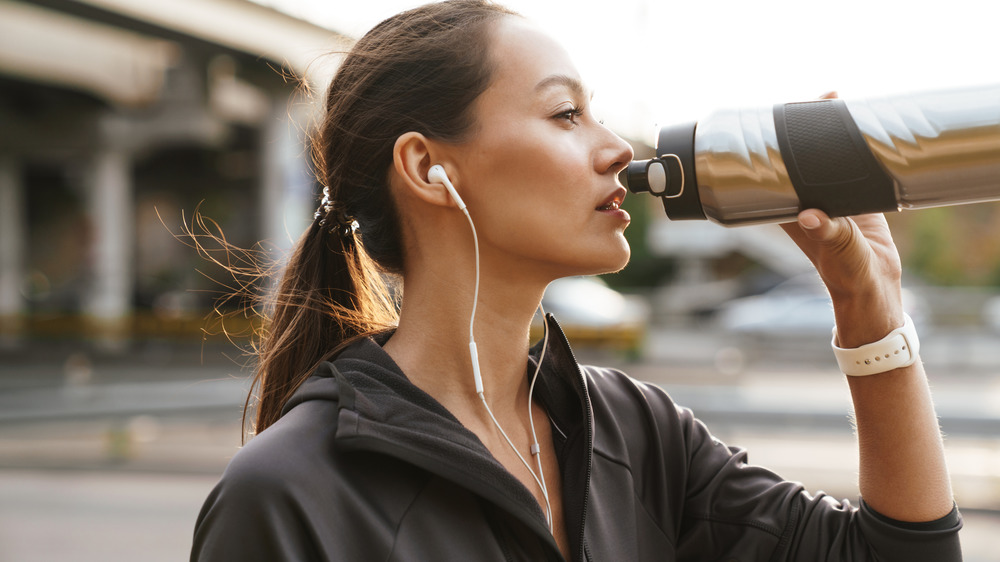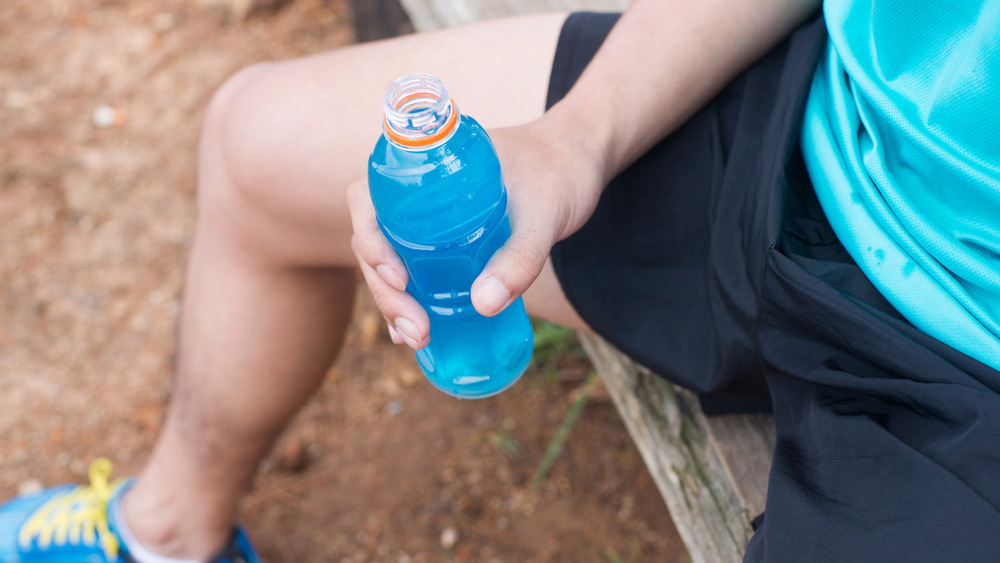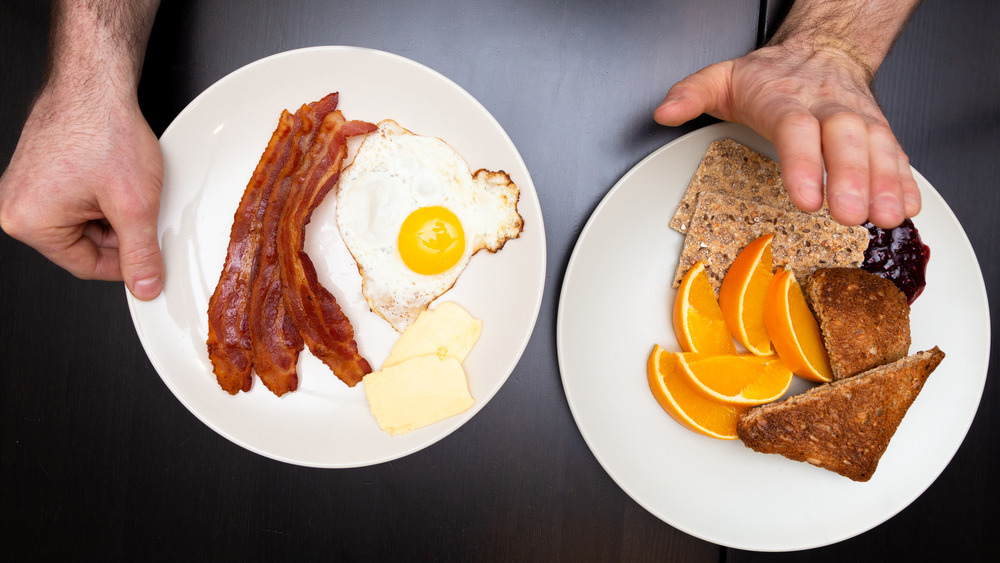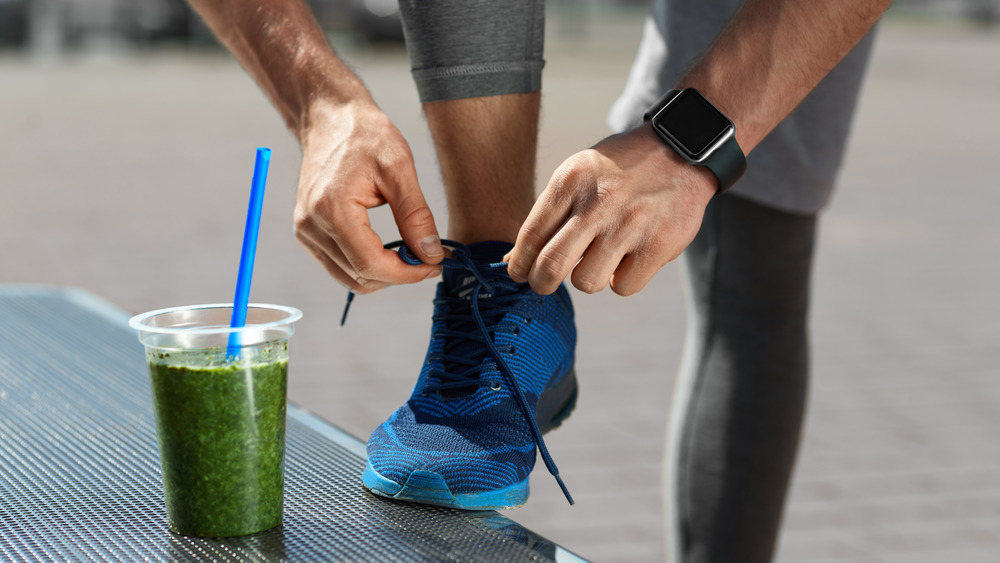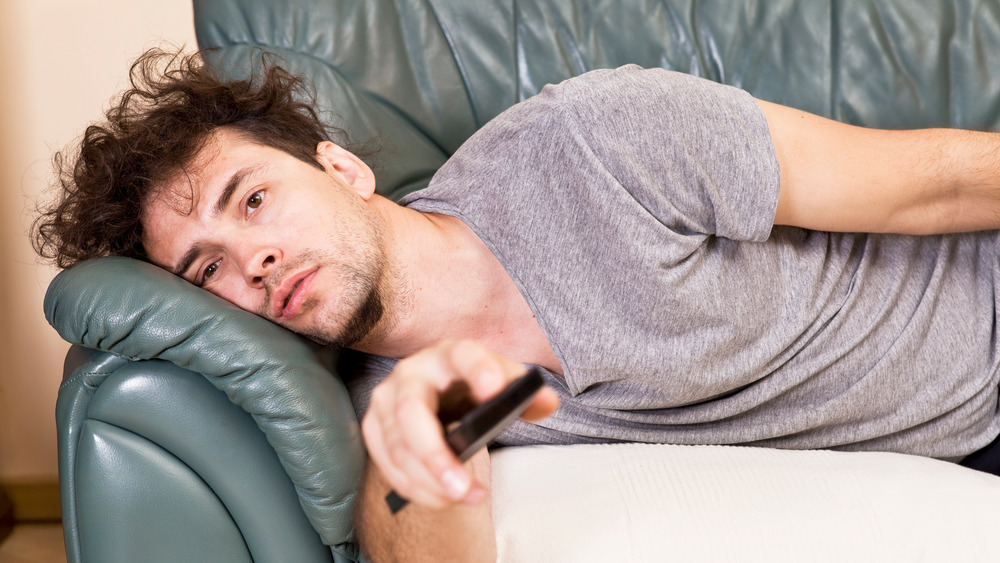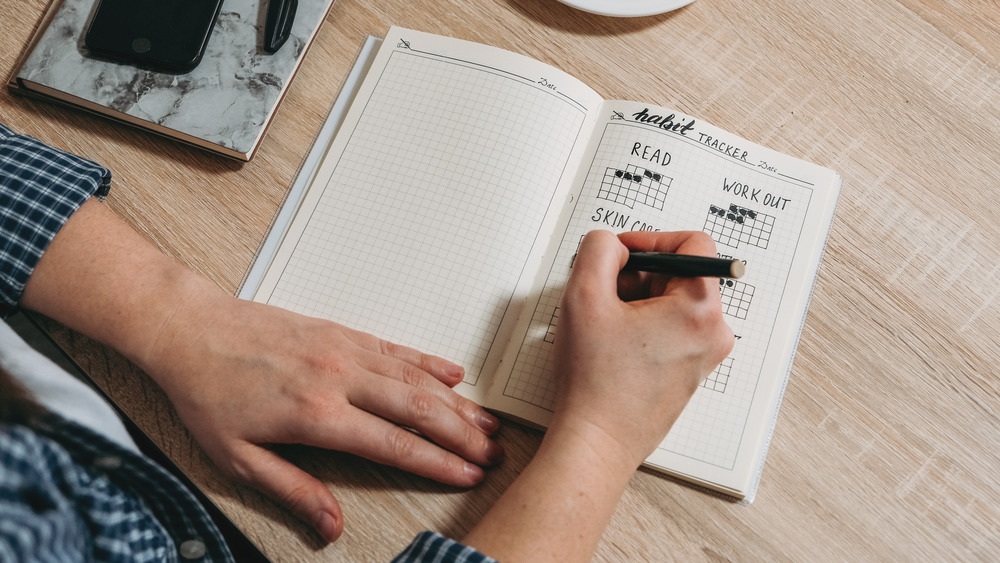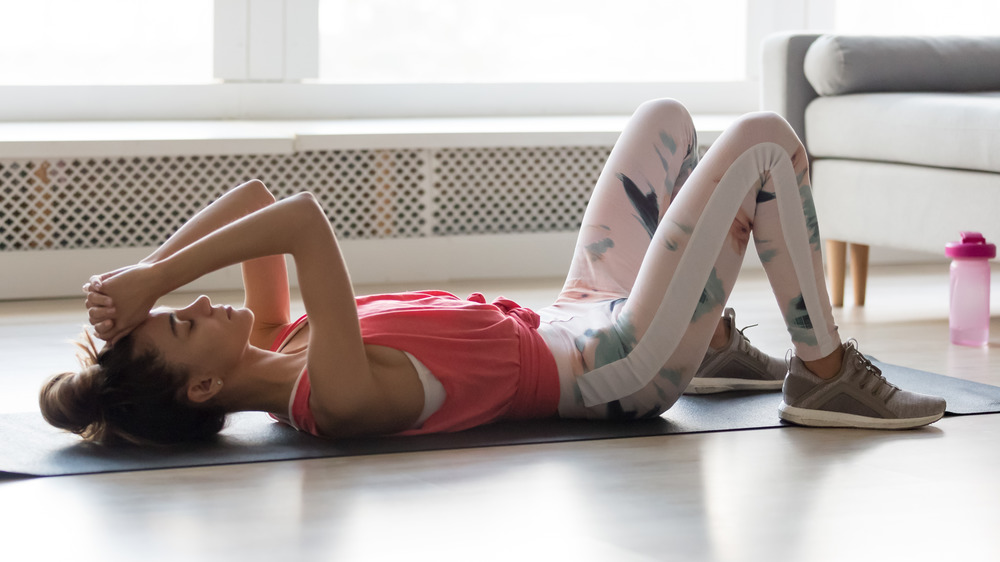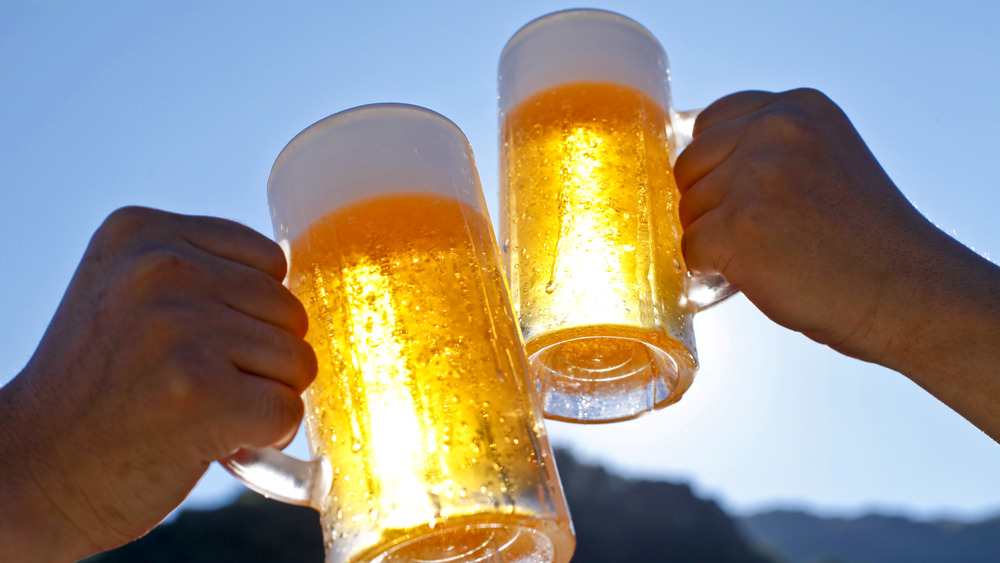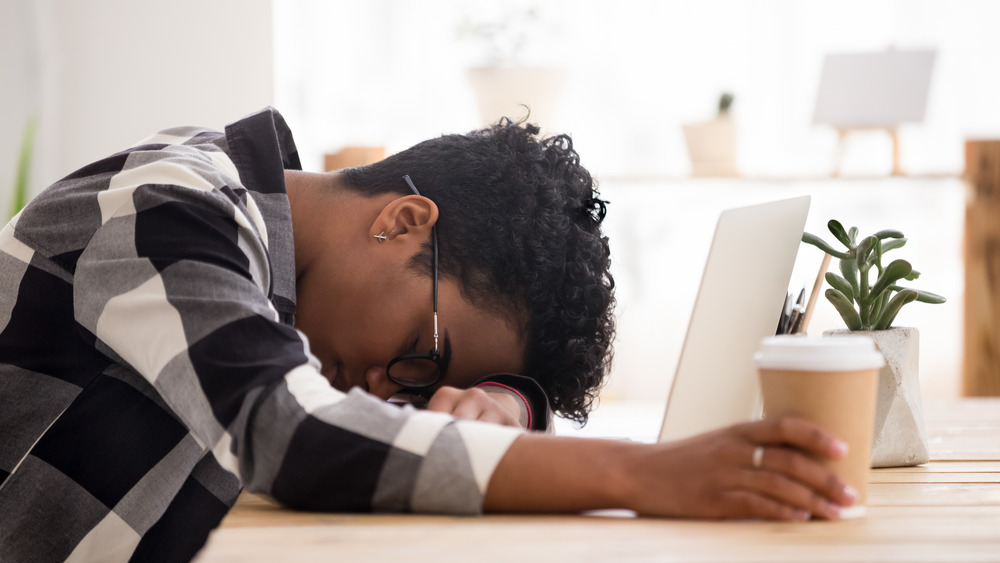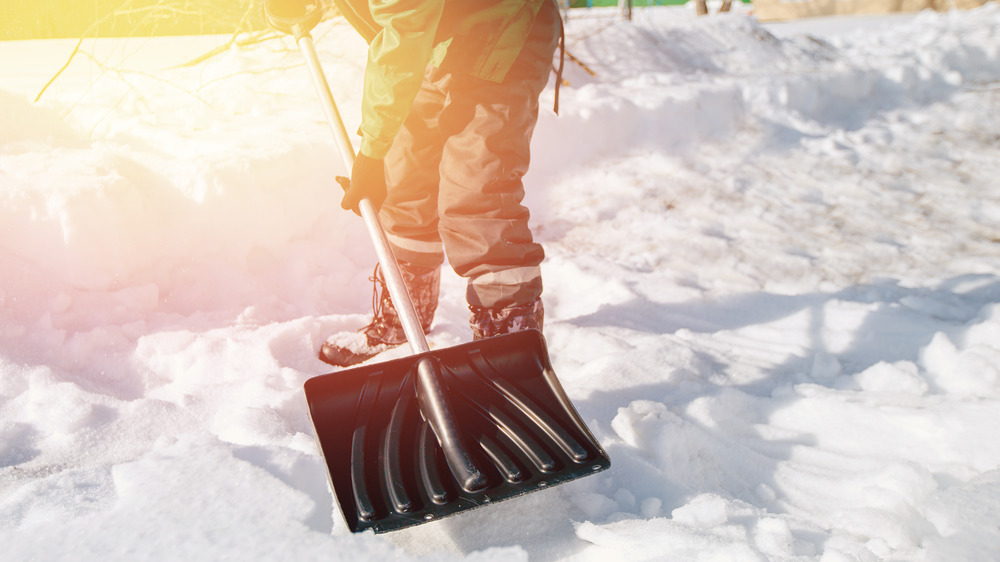The Worst Things You Can Possibly Do After A Workout
Look, logging your daily workout is a must-do. Not just because it can help you attain and maintain the strong arms and chiseled abs of your dreams, but because it's incredibly good for your long-term health. But it's not just the hours logged at the gym that matter — your post-workout routine makes a big difference in what type of results you end up seeing from your exercise routine. This is because while exercise itself places stress on your body's systems, forcing it to work harder than if you were just lazing about, it's the hours after your workout where your body actually rebuilds, repairs, and becomes stronger and more efficient.
As Healthline pointed out, appropriate recovery can also prevent muscle fatigue, reduce risk of injury, and support healthy sleep. If you fail to give your body the rest and recovery it needs, you're basically setting yourself up for sub-par results. Or at least, a slower journey to your fitness goals. So if you're dedicated to your workout and you want to see the best results possible, think twice before committing these post-workout faux pas.
Failing to make time for a post-workout cool-down is a big mistake
When you're cruising in a car at 75 miles per hour, you very rarely slam on your brakes and come to a complete stop in a second, right? If you do, you're in for quite a jolt, and the car's brakes may lock or the tires skid. You intuitively know it's better to slow down at a steadier pace. Your body is no different. Running on a treadmill at 7 miles per hour only to immediately stop and sit down gives your systems a jolt. As Verywell Fit explained, a sudden stop makes it so you're more likely to experience a sudden change in blood pressure that could cause dizziness or lightheadedness.
To prevent this from happening, and to encourage a gradual return to your normal heart rate and breath rate, carve out about five to 10 minutes to ease your way out of your workout. If you're doing cardio, reduce the intensity and slow down, ending at a relaxing pace that you maintain for a few minutes. If you're strength training, walk around and stretch the muscles you worked slightly to help prevent potential cramping.
Neglecting to make time for stretching or foam rolling may increase your risk of injury
Stretching can seem like an unnecessary "extra" you can't quite make time for, but stretching, especially after a workout, is incredibly important for all-around health. In fact, the best time to work on flexibility training to maintain or improve your range of motion is when your muscles are still warm from working out.
This may seem like something only yogis need to care about, but if you have poor flexibility, it can impact your day-to-day life. Just think about it: If your hips, back, or shoulders lose flexibility, your gait may change or it may be harder to reach for things. Plus, bending, twisting, or even walking can become uncomfortable or painful.
As Verywell Fit pointed out, just 10 to 15 minutes of total-body stretching after a workout can help you maintain healthy joints and prevent injury. And, as a Harvard Health Letter detailed, adding foam rolling to your after-workout stretching routine can boost flexibility training even more while helping reduce muscle soreness. You may not feel the results right this minute, but making time to stretch and foam-roll can make a world of difference in the long term.
You risk dehydration if you don't drink sufficiently after working out
You know you need to drink water after a workout, but are you really taking the time to do it? Here's the deal: Your body is roughly 50 to 60 percent water. Water is the medium in which all of your body's processes take place. Right after your workout is when your body is at its busiest, repairing and strengthening all the systems you just put through the ringer. If you fail to restore your body's fluid levels, you're making it that much harder for your body to effectively recover after your workout.
As an article published on Michigan State University Extension states, "Drinking water is the best way to rehydrate and cool your body from the inside out. Rehydrate after exercise by drinking enough fluid to replace fluid losses during exercise."
If you don't know how much fluid you lost, and easy way to tell is to weigh yourself before and after your workout. According to an article on Verywell Fit, you should drink about 16 to 24 ounces of water for every pound lost. And yes, weight lost during workouts is pretty much just water, you shouldn't think you're undoing your hard work by "drinking it back."
Drinking sugary sports drinks after your workout isn't exactly a healthy habit
There is a time and place for sports drinks, but for most people, that's not after a standard workout. Sports drinks were developed and designed for athletes. And not the type of athlete that logs a tough 30- or 45-minute workout and calls it a day. They were made to help endurance athletes maintain electrolyte balance and blood glycogen levels (circulating sugars) to sustain high-intensity activity. Think: marathon runners or basketball players playing back-to-back games for several days straight. For the average exerciser, sports drinks represent largely unnecessary calories and sugars.
So what should you drink? As WebMD stated, "Good old fashioned tap water does the trick." If you're not performing high-intensity, super sweaty exercise for over an hour, water will help you rehydrate, and your regular diet will help you restore electrolyte levels to their pre-workout levels. But if water sounds entirely too boring, try mixing water with 100 percent juice or a opt for a drink that provides additional nutrition, like vitamins or protein.
Overeating following your workout may stall your efforts
Sure, you need to eat after you exercise. That's a given. And, of course, you burned serious calories during your routine — give yourself a pat on the back. But before you "reward" yourself with permission to eat a whole pizza and a side of sweet potato fries, slow your roll.
Julius Jamison, a personal trainer at New York Health and Racquet Clubs, told Shape, "Fats slow down the digestive process, so you never want to consume too much after your workout." Plus, if one of your fitness goals is weight loss, going overboard on calories is going to make it harder to shed the pounds.
The goal for after-workout refueling is to consume a small, nutrient-rich meal that gives your body the types of fuel it needs to ramp up recovery. "You want to eat 'fast-acting' nutrients that are able to enter the bloodstream and get to the cells quickly," said Jamison. Focus on high-quality carbs and proteins, like a bowl of cereal, chicken and potatoes, or rice and beans. Then as the day wears on, stick to vegetables, fruits, and lean proteins in smart portions.
This is why you should think twice before skipping the post-workout carbs
You may think a low-carb diet is the best way to shed pounds and see results. But as nutritionists will tell you, that information is largely inaccurate. For the vast majority of people (and yes, there are exceptions, although those should be discussed with a registered dietitian), carbohydrates are an essential nutrient that's vital for recovery and metabolism.
As Healthline detailed, your body uses its glycogen stores (made from carbohydrates) as fuel during exercise. Depending on how long or how intensely you exercise, you may actually use all of your glycogen stores in a single workout (if you've ever heard runners refer to "bonking," this is what they're talking about). To restock your system and keep your metabolism ticking (not to mention, keep your brain functioning at maximum capacity), aim to eat a mixed meal of carbs and proteins within about 30 minutes of your workout.
As long as you're not a high-performance athlete, you don't need to overthink this meal or stuff yourself with an excess of carbs. Rather, time your next meal to line up with your post-workout needs and make sure it's healthy and well-balanced.
Forgetting to add protein to your post-workout snack hurts your recovery
If your post-workout meal involves a quick stop at the vending machine, don't grab a bag of Doritos and a Gatorade and call it a day. Proteins provide you with a source of amino acids, which are the building blocks of your cells. When you exercise, the stress you place on your muscles creates micro-tears in your muscle fibers and a breakdown of muscle protein.
After your workout, your body goes to work repairing those tears, aiming to build them stronger and more resilient than they were before. It's hard to get the most out of your workout if you fail to give your body the stream of "building blocks" it needs to repair your muscles efficiently and effectively after your routine, according to Healthline.
As the publication explained, your best bet is to consume between 20 to 40 grams of protein after exercise to maximize recovery. If you're in a hurry, a protein shake or bar can do the trick, but you can also hedge your bets by eating a little protein before your workout and a little more after. Even a couple boiled eggs can do the trick.
Turning into a couch potato after your workout isn't advised
If you think breaking a sweat at the gym "earns" you the right to sit in front of the TV all night watching Netflix, it's time to think again. Yes, regular exercise is essential for long-term health, and your daily workout is a big part of the picture — but it's not the only part. For one thing, sitting may lead to tight, sore muscles. "You definitely want to start moving or your body's going to tighten up," Rebecca Kennedy, a master trainer at Barry's Bootcamp, told Shape, emphasizing the need for active recovery. "There are all different kinds of benefits, like stimulating blood flow, relieving soreness, reinforcing good posture."
Beyond active recovery, sloth-like behavior is actually an independent risk factor for heart disease. In a CBS News report on the American Heart Association's assessment that people are spending entirely too much time sitting, Dr. Barbara George, director of the Center for Cardiovascular Lifestyle Medicine said, "All studies are indicating that moving more throughout the day — in addition to getting the recommended 30 minutes of moderate activity on a daily basis — is necessary to lower one's risk of heart disease and other causes of mortality."
Forgetting to track your workout makes it hard to stay on track
Going to the gym (or hitting the pavement) is certainly an awesome first step toward reaching your goals. But according to Verywell Fit, failing to set goals, plan workouts, and track your progress is a big mistake people often make. As the saying goes: If you don't know where you're going, how will you know when you've arrived?
If you haven't already done so, spend an hour or so organizing your workout plan. Start by setting goals, and be specific — what, exactly, do you want to achieve from your workout, and when or how will you know when you're successful? Then, put a plan in place that's designed to help you meet those goals. Know how many days each week you want to workout, what type of workout you'll do on any given day, how long you plan on exercising, and how you'll know you're staying on track.
With this plan in mind, set time aside every week to schedule your workouts into your calendar. Make them non-negotiable. Then during and following each workout, log what you did, how you felt, and what goals you have for your next workout based on the day's results.
Failing to eat for hours after your workout can cause a number of issues
Food: it's important. And it's especially vital when you're trying to build muscle and burn fat. But in today's busy world, it's all too easy to rush in and out of a workout without thinking about grabbing a snack. And if you're pulled immediately into life's hustle, you may realize that hours go by before you're able to scarf something down. And look, if this happens once or twice, the world's not going to come crumbling down and your body isn't going to go into revolt. But if it becomes a habit, it's time to start stocking your gym bag with grab-and-go eats.
Skipping post-workout meals can leave you fatigued and disoriented, and it can hinder your body's recovery, personal trainer Amy Marturana Winderl explained in an article for Self. This is particularly true after tough workouts zap your glycogen stores and leave you with low blood sugar, or after strength workouts designed to help you build muscle mass. For days when you know you'll be rushing out of the gym, Winderl suggests keeping a Greek yogurt, crackers, and fruit at the ready for a quick refuel.
Keeping your sweaty workout clothes on is a recipe for disaster
First, walking around in sweaty clothes for hours is pretty grody. And it doesn't smell good. Those two reasons alone should be enough to make you hightail it to the showers after your time at the gym. But if, for whatever reason, you don't have time to actually shower off after your workout, at the very least, pack an extra set of clothes and do a quick change in the bathroom.
As Dr. Mary Sheu, physician and assistant professor at the Johns Hopkins University School of Medicine, told Popsugar, "You really should change as soon as possible after sweating or else you are susceptible to irritant rashes, acne/folliculitis, and a bacterial or yeast infection." None of which sound all that appealing, right? And if you can't change immediately, she suggests toweling off to reduce the amount of sweat and bacteria sitting on your skin, and using a cleansing wipe to give you a somewhat-clean feeling.
Better yet, make a habit of throwing a change of underwear and clothes into your gym bag. Three minutes in the bathroom and you can be in sweat-free clothes. Your body (and everyone around you) will be grateful for the effort.
Drinking too much alcohol after working out certainly won't help your muscles
Grabbing a beer with friends after a workout is sometimes enough motivation to get you to actually do your workout. But there's a big difference between downing a beer and downing five beers.
The reality is: Alcohol isn't exactly a post-workout aide. Ever. As Time highlighted, multiple studies have shown that alcohol can actually hinder your body's ability to recover effectively, lowering rates of protein synthesis to build and repair muscle and possibly limiting muscles' ability to take up and utilize glucose. That said, J. Leigh Leasure, the director of behavioral neuroscience lab at the University of Houston, noted that people who enjoy alcohol often engage in exercise because they both release feel-good chemicals in the brain.
So there's likely a happy trade-off; if beer-time socialization is enough to make you want to go to the gym, it might just be worth it. And ultimately, one or two drinks are unlikely to impact your post-exercise recovery very much. So if you look forward to your post-workout beer, go ahead and indulge. Just don't down a whole keg.
Your body won't be able to repair itself if you pull an all-nighter after working out
Post-workout recovery doesn't just refer to stretching, eating, and cooling down immediately following your routine. It also has to do with deep rest and sleep. The hours you log in bed are some of the most important hours your body spends repairing and rebuilding your cells.
As W. Christopher Winter, physician and the president of Charlottesville Neurology and Sleep Medicine, told Everyday Health, "If you don't sleep, you undermine your body." He went on to explain that sleep is when the body produces growth hormone, and it's this hormone that assists with building lean muscle and repairing the cellular damage that takes place during exercise.
In a nutshell: "Growth hormone is essential for athletic recovery," he said. And if you're not sleeping enough, you're essentially making your workouts harder and limiting the results you would otherwise experience. This is because adequate sleep can keep you motivated, focused, and energized during your workouts, helping you knock each session out of the park, while also maximizing recovery after the fact. If you're really dedicated to efficiently improving your fitness, prioritize getting at least seven to eight hours of sleep every night.
Overexerting yourself with chores or yard work after working out can be dangerous
Staying active after a workout is a good idea, but you should be cautious about doing strenuous yard work or housework (like chopping wood, hauling debris, or shoveling snow) after you put in a tough day at the gym. This is especially true immediately following your workout when your body is fatigued.
A 2000 study published by Physical Medicine and Rehabilitation Clinics of North America explained that muscle fatigue is complex and multifactorial. You see, muscles don't move by themselves; they require work by the central and peripheral nervous systems, including the brain, spinal cord, nerves, and complex muscular systems. If you're feeling fatigued, all of these systems are likely running a little slow. And if one part of the complex gets out of sync, an injury is more likely to occur.
Muscle injuries, particularly strains, are linked to fatigue. If your body's already fatigued by your workout and you immediately go try to chop wood, you're asking all your systems to function at their best when they're not in a state that's primed to keep working. It's best to save the heavy chores for when you're feeling more energized.




